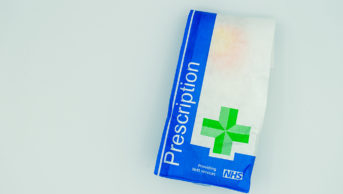
Lucian Milasan / Shutterstock.com
Summary
The pharmacological management of borderline personality disorder is controversial as the effectiveness of treatment is disputed. NICE recommends that drug treatment is not used specifically for borderline personality disorder, but it can be used as a short-term measure in times of crisis and to treat comorbid conditions.
Patients with borderline personality disorder are at increased risk of self-harm, and drug treatment is not appropriate for patients at high risk of overdose. Dialectical behaviour therapy (DBT) is recommended by NICE for women with borderline personality disorder.
Borderline personality disorder is a complex and multifaceted condition and a single treatment approach is unlikely to be effective. It is common for people with severe borderline personality disorder to require multidisciplinary care, e.g. drug treatment, occupational therapy, psychological therapy and housing support.
Ideally, patients should be treated in the community; effective co-ordination of care in a community mental health setting can help keep patients stabilised, whereas long, unstructured admissions to hospital can worsen the condition[1]
.
People with borderline personality disorder often have difficult relationships with health professionals. They may seek out treatments and services only to later reject them, and may have unrealistic expectations of what services can provide. They can demonise some professionals or services and idealise others.
It is important that healthcare professionals understand this is a manifestation of the disorder and not a conscious attempt by the person to manipulate the system. A non-judgemental but consistent approach with clear boundaries is vital[2]
. Good communication between service providers is also essential to avoid disputes and ensure best practice.
Pharmacological treatment
The use of psychotropic medicines in the treatment of borderline personality disorder is controversial. Service users report psychotropic medicines to be helpful, yet many clinicians believe the efficacy of drug treatment is limited and largely attributed to the placebo effect.
In 2010, a Cochrane review[3]
found that second generation antipsychotics and mood stabilisers were effective in treating a number of core symptoms of borderline personality disorder and its associated psychopathology. However, the researchers questioned the robustness of these findings because the trials reviewed involved small numbers of patients for short periods and used different outcome measures.
There are currently no medicines licensed for borderline personality disorder. The National Institute for Health and Care Excellence (NICE) recommends that drug treatment should not be used specifically for the condition, or for individual symptoms or behaviour associated with the disorder. Instead, NICE recommends drug treatment may be used as a short-term measure in times of crisis and for managing comorbid psychological disorders[4]
. However, a recent audit of drug treatment in people with personality disorder, including borderline personality disorder, revealed the prescribing of psychotropic medicines remains high (see Box 1).
Box 1: Results from a national audit of prescribing in personality disorder[5]
| No medicines prescribed | Prescribed at least one medicine | Antipsychotic | Antidepressant | Mood stabiliser | Sedative | |
|---|---|---|---|---|---|---|
Any personality disorder diagnosis only n=1054 | 193 (18%) | 861 (82%) | 579 (55%) | 679 (64%) | 210 (20%) | 452 (43%) |
Any personality disorder with psychotic illness n=485 | 10 (2%) | 475 (98%) | 457 (94%) | 242 (50%) | 220 (45%) | 271 (56%) |
Any personality disorder with affective disorder n=606 | 12 (2%) | 594 (98%) | 411 (68%) | 515 (85%) | 199 (33%) | 347 (57%) |
Patients may have unrealistic expectations of what drug treatment can do, which may lead to them putting pressure on prescribers to start or change medicines frequently. Patients should be told what the medicine is being used for, any effects that can be expected and the limits of pharmacological treatment. Follow-up care is needed to assess any improvements or side effects and evaluate adherence.
Self-harming behaviour is common in borderline personality disorder and drug treatment is not appropriate for patients at high risk of overdose. Limits on medicines supplies (e.g. weekly or twice weekly prescriptions) can help reduce this risk.
Antipsychotics
First-generation (e.g., haloperidol, chlorpromazine) and second-generation (e.g., olanzapine, risperidone and quetiapine) antipsychotics are used to treat specific symptoms of borderline personality disorder, such as pseudo-hallucinations, mood instability, aggression and impulsivity. The evidence supporting their use in borderline personality disorder is variable, yet in clinical practice they are often found to be helpful to reduce levels of distress and anxiety caused by symptoms.
The main subjective effects of antipsychotics are impaired cognition and emotional flattening[6],[7]
. These effects may be welcomed by patients who experience high levels of emotional distress. In line with guidance from NICE, all antipsychotics should be used in a targeted fashion in periods of crisis, with continuous evaluation of risks and benefits.
Antidepressants
NICE recommends antidepressants for managing depression in patients with borderline personality disorder. However, borderline personality disorder worsens depression outcomes, and patients often respond poorly to treatment.
Antidepressants, particularly selective serotonin reuptake inhibitors (SSRIs), are sometimes used for certain symptoms of borderline personality disorder, including impulsivity and mood instability. However, the evidence to support this, both from research and in practice, is poor. Some of the reported subjective effects of antidepressants include emotional blunting (especially with SSRIs)[7]
, which may help to explain any positive effects observed.
Mood stabilisers
Although mood instability is a key symptom of borderline personality disorder, the efficacy of mood stabilisers is unclear, with a paucity of good research to support their use. Co-morbid mood disorders are often seen with bipolar disorder, in which mood stabilisers may be considered. Valproate should not be used by women of childbearing age because of the risk of teratogenicity.
Anxiolytics, hypnotics and sedatives
The majority of medicines used as sedatives are benzodiazepines (e.g., lorazepam, diazepam) or z-drugs (e.g., zopiclone, zolpidem). They can be helpful in the treatment of borderline personality disorder when used for short periods for crisis management, for example during a short inpatient hospital admission.
This is likely to be the result of the emotional suppressant effects of sedative medicines. In practice, these effects are generally short-lived and, combined with the addictive properties of the drugs themselves, can lead to overuse.
Benzodiazepines can cause disinhibition, which is a concern in borderline personality disorder because patients can be impulsive. The use of any of these medicines in borderline personality disorder therefore requires a well planned and collaborative approach (e.g. using time-limited prescriptions).
Any benzodiazepines used in an acute ward will not be continued in the community. As an alternative, patients can be prescribed sedating antihistamines (e.g. promethazine) as they are not addictive, although there is little evidence to support their use.
Psychological therapy
New evidence on the efficacy of various psychological approaches to managing personality disorders is emerging[8]
and a range of therapies now have a small, but growing, evidence base.
Psychological therapy aims to encourage self-reflection, improve interpersonal and emotional understanding, challenge and modify dysfunctional core beliefs and achieve better environmental adjustment[9]
. It is recommended that people attend twice-weekly psychotherapy sessions and treatment duration should be no shorter than three months[4]
.
A comprehensive dialectical behaviour therapy (DBT) programme is recommended by NICE for women with borderline personality disorder[4]
; it is not recommended for men because studies have predominently involved women. DBT was developed from cognitive behavioural therapy specifically for borderline personality disorder. It is often delivered as a group skills-training session with telephone consultations and individual coaching sessions offered alongside. The aim of DBT is to increase a person’s capacity to regulate him or herself, focusing on interpersonal effectiveness, distress tolerance, emotion regulation and mindfulness[10]
.
Make our learning modules a regular part of your continuing professional development
Borderline personality disorder: management
Two 15-question CPD modules on borderline personality disorder, one for each article, are available at www.pharmaceutical-journal.com. To complete the module, sign in to the website and go to the article, available in the Learning section or from the Clinical Pharmacist homepage.
To start your assessment, select ‘start survey’ in the top right of the page. The questions will test your knowledge on all aspects of the article. You have three attempts to achieve the pass mark of 70%. You can also download a copy of the article to support your learning.
The module will remain open for one year. When you have passed the assessment you will receive your grade and will be able to download a certificate of your learning.
You can find more modules to take from The Pharmaceutical Journal and Clinical Pharmacist, and access your CPD history and portfolio, in the “My CPD” section of your user account.
Christopher Todd is a mental health pharmacist, Justine Raysnford is a mental health pharmacist and Kay Radcliffe is a third year psychologist in clinical training, all at Leeds and York Partnership NHS Foundation Trust.
E: christopher.todd1@nhs.net
References
[1] Bateman AW & Tyrer P. Services for Personality Disorder: Organisation for Inclusion. Adv Psychiatric Treat 2004 10:425–433.
[2] Livesley J. Practical Management of Personality Disorder. London:The Guilford Press, 2003.
[3] Lieb K, Vollm B, Rucker G et al. Pharmacotherapy for borderline personality disorder: Cochrane systematic review of randomised trials. Br J Psychiatry 2010;196:4–12.
[4] National Institute for Health and Care Excellence. Borderline Personality Disorder: Treatment and Management. London: NICE 2009.
[5] National Prescribing Observatory for Mental Health (POMH-UK). Topic 12A — Prescribing for people with a Personality Disorder. London: Royal College of Psychiatrists, 2012.
[6] Mizrahi R, Bagby RM, Zipursky BB et al. How antipsychotics work: the patients perspective. Prog Neuropsychopharmacol Biol Psych 2005;29:859–864.
[7] Moncrieff J, Cohen D & Mason JP. The subjective experience of taking antipsychotic medication: a content analysis of Internet data. Acta Psychiatr Scand 2009;120:102–111.
[8] Fonagy P. Personality Disorder. J Mental Health 2007;16:1–4.
[9] Bateman AW & Tyrer P. Psychological treatment for personality disorders. Ad Psychiatric Treatment 2004;10:378–388.
[10] Linehan MM. Skills Training Manual for Treating Borderline Personality Disorder. London: The Guilford Press 1993.


